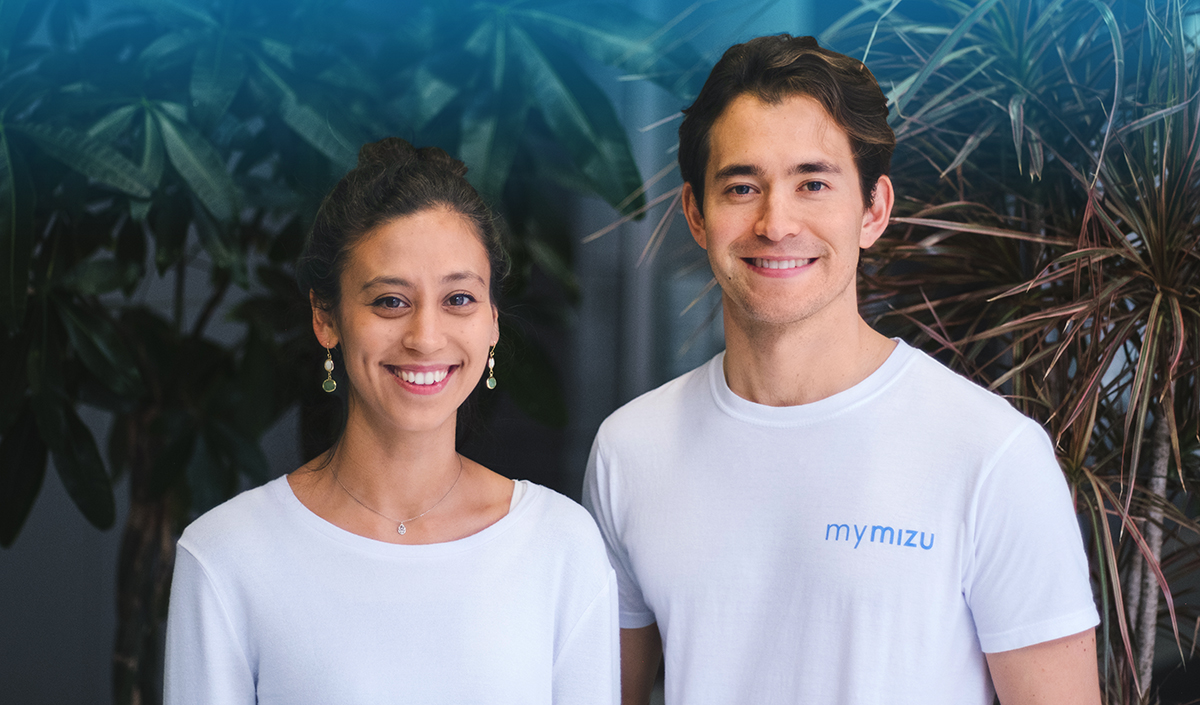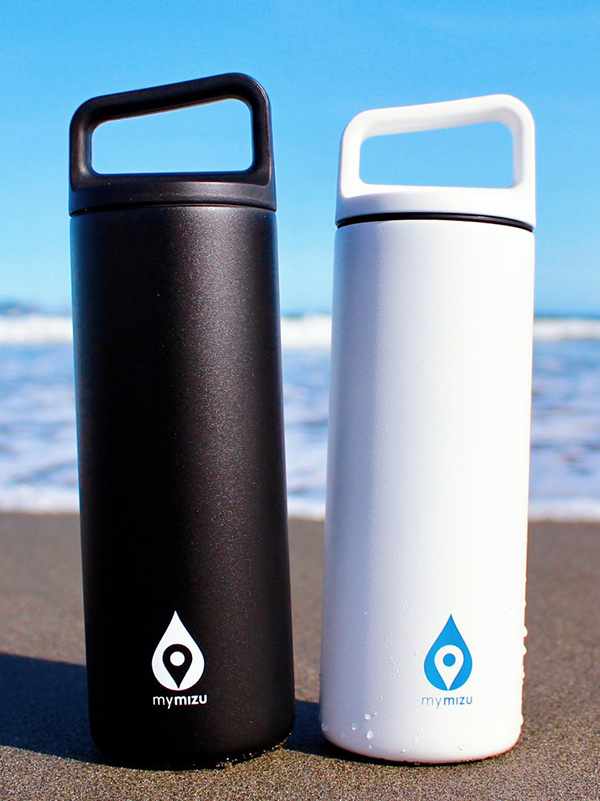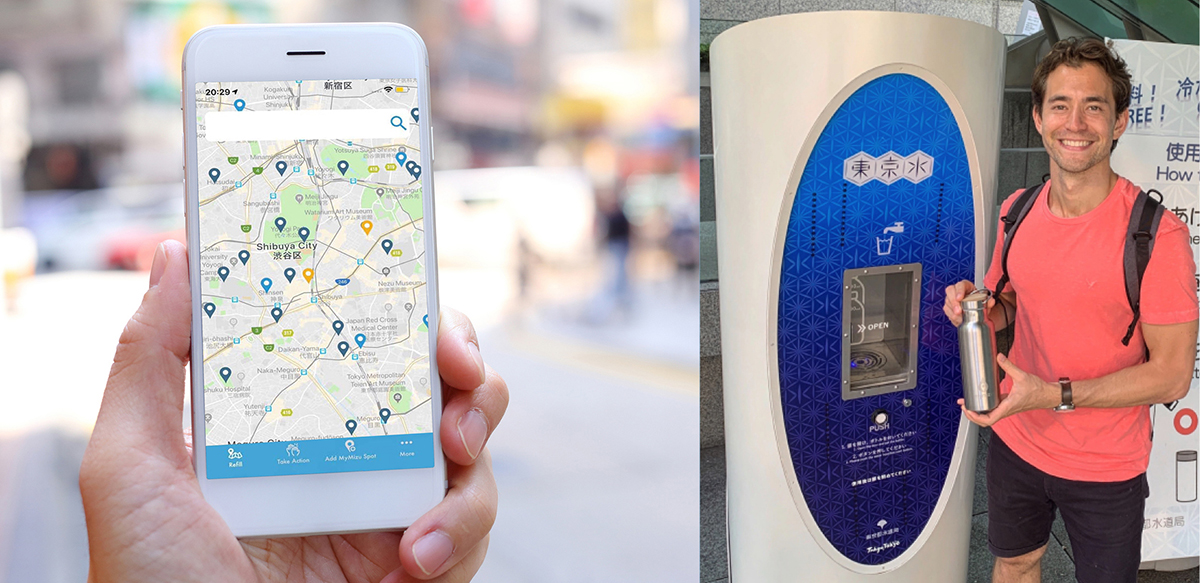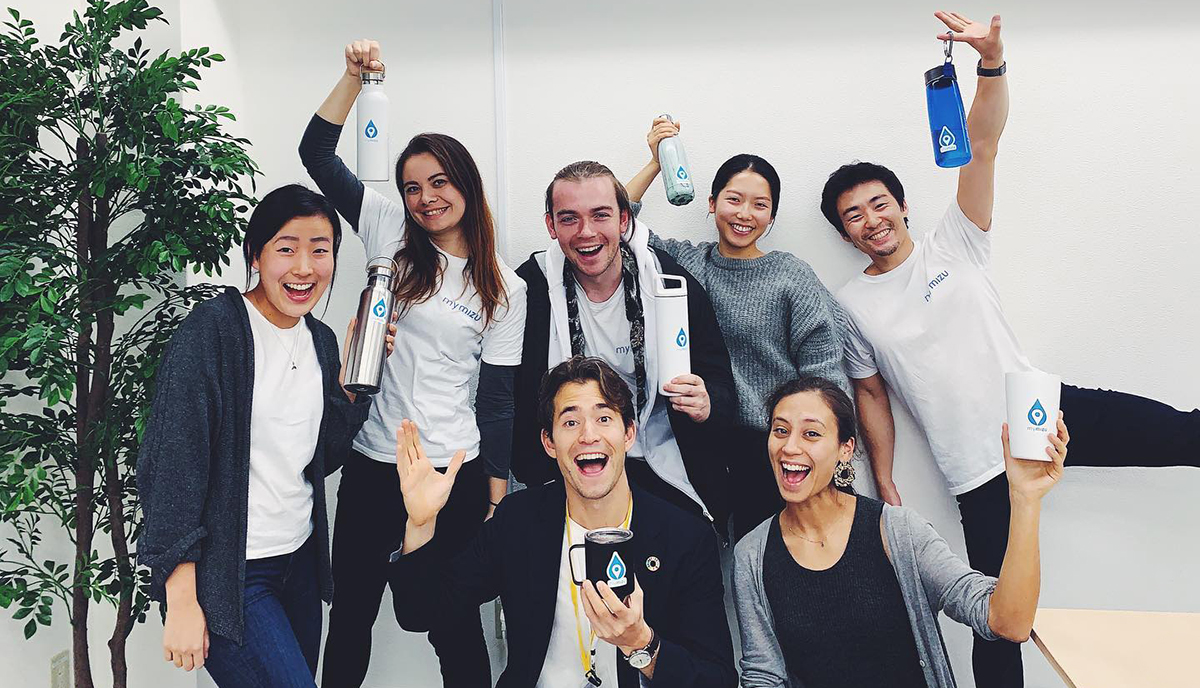Each day, Japanese consumers empty 69mn PET bottles. Multiply that by 365 and you get 25bn—enough to circle the world 128 times. And that’s the number today. It’s growing all the time. Slowing—and ultimately reversing—this trend is critical if we are to repair the environment and leave a healthy world for future generations. Using refillable bottles is one way to reduce plastic consumption, and mymizu is on a mission to help people live more sustainably in ways that are fun, easy and good for the planet. ACUMEN spoke with co-founders of mymizu (and its parent organisation Social Innovation Japan) Robin Lewis and Mariko McTier—a judge at the British Chamber of Commerce in Japan’s 2019 British Business Awards—about what drives their passion for sustainability and how mymizu is partnering with the business community.

Please tell us about your job and recent successes.
Robin: Our work is quite varied. One moment we are working on developing a collaboration with a corporate partner, the next we are managing our database of mymizu refill points. Then we might be preparing to run a sustainability seminar or ideathon. No two days are the same! We have more than 20 team members (full-time, part-time, interns and volunteers), so a lot of our time is spent working with these brilliant individuals to further our mission.
To highlight a few recent successes, we were chosen as joint winners of the annual UK-based Chivas Venture competition, considered one of the world’s top social business competitions. We were also the first Japanese organisation to win the coveted iF World Design Guide Social Impact Prize, and we recently launched collaborations with some major firms, including Audi Japan and Ikea, as well as local governments such as Kobe City, which we’re excited about!
Mariko: Our work has also started to be highlighted by major news agencies, such as NHK, Asahi Shimbun, and Nippon TV, and this is a critical part of achieving our mission—to make it more normal to talk about the social and environmental challenges we face, as well as the things we can do to tackle them.
 How did you become so passionate about this?
How did you become so passionate about this?
Mariko: I was lucky to have the opportunity to delve into topics such as climate change and a whole range of social and environmental issues—as well as getting to interview those who are working to tackle these challenges—when I worked as a journalist in London. When at the British Embassy in Tokyo, I was again lucky to work with innovative start-ups and businesses, and as program manager for the Innovation is GREAT campaign I was inspired by some of the amazing work I saw, whether it be from social entrepreneurs, innovative government or business initiatives—often a combination of all the above. But I also felt that there was a great amount of opportunity being wasted here in Japan. There is so much potential—highly educated people, cash-rich businesses, a strong technical history and a generally peaceful society to build on—but I felt like a lot of it was going to waste.
Robin: The Great East Japan Earthquake and Tsunami of 11 March, 2011, and the subsequent nuclear crisis in Fukushima, made me question what is really important, and also fuelled my interest in sustainability, climate change and so on. I spent more than half a decade working in humanitarian aid and international development after the earthquake. I was based in Japan but worked in countries such as Nepal, Haiti and Mozambique—mainly in post-disaster situations. These experiences shaped my perspective and made me realise just how important social and environmental issues are to our success—and our survival.

The mymizu app helps you locate refill stations.
How can BCCJ members and others help?
Mariko: In so many ways! I would invite readers to:
- Download the (free!) mymizu app
- Track your refills using the app and join us in demonstrating just how much demand there is for #plasticfree hydration
- Introduce mymizu to your favourite shops
and cafés using the in-app menu in English or Japanese - Check out our online store if you’re looking for a great, sustainable bottle to start your refill journey
- Get in touch if there are any ways that we can work together!
What other plans do you have?
Robin: We are building a network of teams to help build momentum and scale our activities. In fact, we established a team in Singapore earlier this year and plan to continue localising our movement across Japan and the world. We are also continuously creating new partnerships with like-minded firms, establishing alliances with local governments and working with civil society groups to grow the movement for sustainability. For instance, we are planning a new and exciting project with a major beverage-maker to help reduce plastic consumption. Watch this space!

What are some of the products you sell online?
Mariko: We launched a new product line on Earth Day (22 April) that supports the cleaning of the oceans. Our goal with the store was to further our work to protect the environment through the sale of mymizu-branded reusable bottles (in partnership with MiiR, a registered B corporation based in Seattle, Washington) and organic cotton T-shirts. Profits from the sale of these items are used to fund beach clean-ups (one purchase = 1kg of ocean-bound waste cleaned up), the running of the free mymizu smartphone app and educational activities to promote sustainable living.
How was World Oceans Day this year?
Robin: It was great! We had to shift away from our plans to hold large-scale events and clean-ups on 8 June due to Covid-19. Instead, we released a series of videos made by our mymizu Ambassadors—world record-holding freediver Ai Futaki and four-time Japanese stand-up paddle champion Kenny Kaneko—about the importance of our oceans to celebrate the special day! We also held a bilingual online quiz about oceans, sustainability and marine plastic pollution, as well as launching a blog series with a piece on microplastics.
How has the virus affected you?
Mariko: We’ve faced many challenges, such as cancellations and postponements of projects and events due to the coronavirus pandemic. We also onboarded two new full-time staff fully remotely, which was a new experience for us! But, on the bright side, we’ve been able to do so many things that we weren’t able to do before. We’ve been able to build community nationwide—and even across borders—by hosting weekly events online and connecting with our community in new ways.
